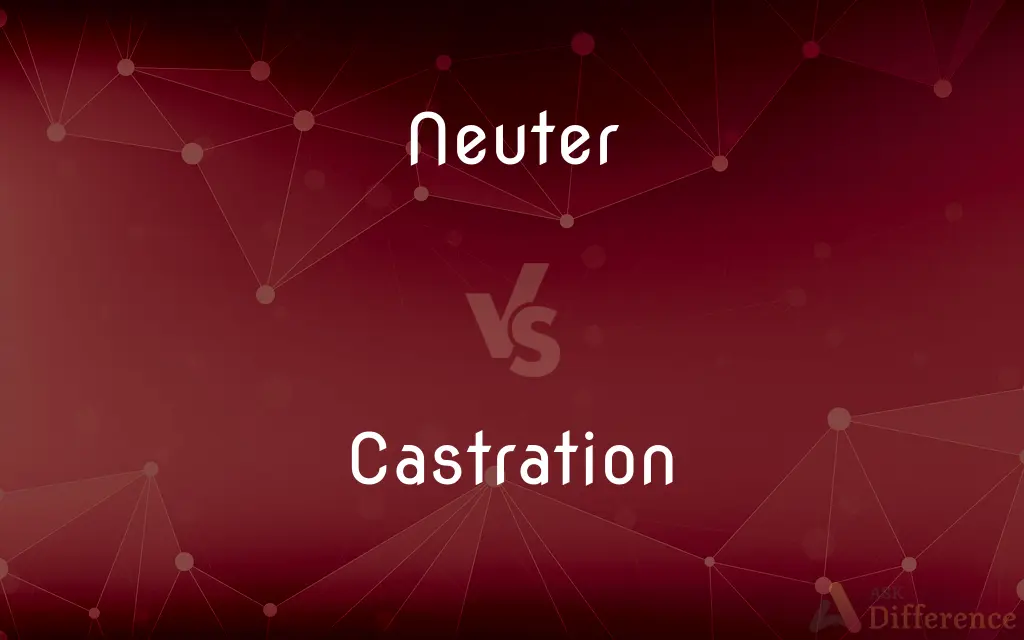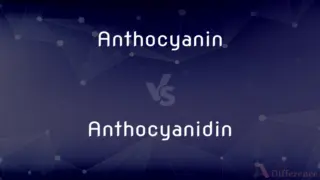Neuter vs. Castration — What's the Difference?
By Urooj Arif & Fiza Rafique — Updated on March 19, 2024
Neutering involves removing reproductive organs to prevent breeding, while castration specifically refers to removing the testes in males.

Difference Between Neuter and Castration
Table of Contents
ADVERTISEMENT
Key Differences
Neutering and castration are terms often used in the context of rendering animals incapable of reproducing. Neutering is a general term that applies to both males and females; it refers to the surgical removal of an animal's reproductive organs. In males, this procedure is specifically called castration, where the testes are removed to prevent sperm production and significantly reduce the production of male hormones, such as testosterone. In females, the neutering process is commonly referred to as spaying, and it involves the removal of the ovaries and usually the uterus. This distinction is crucial as it influences not only the reproductive capabilities of the animals but also their behavior and, in some cases, their health.
While both procedures are aimed at preventing the birth of unwanted animals, they have different effects on the health and behavior of the animals. Neutering, in a broad sense, can lead to a reduction in certain health risks for both male and female animals, such as the risk of ovarian or testicular cancer. On the other hand, castration specifically leads to a decrease in behaviors such as roaming, aggression, and marking territory in males. It's important to consider these outcomes when choosing to neuter an animal.
The choice between neutering and castration (for males) or spaying (for females) may also be influenced by the age and breed of the animal, as well as the owner's preferences and the animal's health status. Veterinarians can offer advice based on these factors, ensuring the most suitable procedure is chosen for each individual animal.
While both neutering and castration are irreversible procedures that prevent animals from reproducing, the broader social and health benefits, such as controlling the pet population and reducing the risk of certain diseases, often outweigh the drawbacks. However, it's essential for pet owners to fully understand the implications of these procedures, including the potential changes in behavior and the physical recovery process.
Comparison Chart
Definition
Removal of reproductive organs in animals.
Specifically, removal of the testes in males.
ADVERTISEMENT
Applicability
Both male and female animals.
Only male animals.
Primary Purpose
Prevent reproduction and reduce health risks.
Prevent reproduction; reduce testosterone-related behaviors.
Behavioral Effects
Can reduce risk-seeking behaviors in both gender.
Specifically reduces male-specific behaviors like aggression.
Health Benefits
May reduce the risk of ovarian, uterine, and testicular cancers.
Reduces the risk of testicular cancer and some prostate problems.
Compare with Definitions
Neuter
A surgical procedure to eliminate reproductive function.
The vet clinic offers a discount for the neuter procedure during the spring.
Castration
A surgical method to control animal population.
Castration is part of the community's effort to manage stray populations.
Neuter
The act of removing reproductive capabilities.
After the neuter surgery, the cat recovered quickly.
Castration
A procedure to prevent male animals from breeding.
They scheduled the castration for their young bull to avoid aggressive behaviors.
Neuter
To render an animal unable to reproduce by removing their reproductive organs.
They decided to neuter their cat to prevent unwanted kittens.
Castration
The act of making a male animal sterile.
Castration can lead to a calmer disposition in male pets.
Neuter
A non-reproductive state in animals.
A neuter dog is often less aggressive.
Castration
The removal of the testes in male animals.
Castration is a common practice in livestock management.
Neuter
Neither masculine nor feminine in gender.
Castration
Elimination of the source of male hormones.
Castration significantly reduces testosterone levels in males.
Neuter
Neither active nor passive; intransitive. Used of verbs.
Castration
Castration (also known as orchiectomy or orchidectomy) is any action, surgical, chemical, or otherwise, by which an individual loses use of the testicles: the male gonad. Surgical castration is bilateral orchiectomy (excision of both testicles), while chemical castration uses pharmaceutical drugs to deactivate the testes.
Neuter
Having pistils and stamens that are nonfunctional or absent.
Castration
To remove the testicles of (a male); geld or emasculate.
Neuter
Castrated or spayed. Used of animals.
Castration
To remove the ovaries of (a female); spay.
Neuter
(Archaic) Taking no side in a dispute; neutral.
Castration
To deprive of virility or spirit; emasculate.
Neuter
The neuter gender.
Castration
An individual who is incapable of reproduction as a result of removal, destruction, or inactivation of the gonads.
Neuter
A neuter word.
Castration
(surgery) The act of removing the testicles.
Neuter
A neuter noun.
Castration
(figuratively) Any act that removes power from a person (particularly a man) or entity.
Neuter
A castrated animal.
Castration
The act of castrating.
Neuter
(Archaic) One that is neutral in a dispute.
Castration
Neutering a male animal by removing the testicles
Neuter
To castrate or spay.
Castration
The deletion of objectionable parts from a literary work
Neuter
To render ineffective or powerless
A scandal that neutered the politician.
Neuter
Neutral; on neither side; neither one thing nor another.
Neuter
(grammar) Having a form which is not masculine nor feminine; or having a form which is not of common gender.
A neuter noun
The neuter definite article
A neuter termination
The neuter gender
Neuter
(grammar) Intransitive.
A neuter verb
Neuter
(biology) An organism, either vegetable or animal, which at its maturity has no generative organs, or but imperfectly developed ones, as a plant without stamens or pistils, as the garden Hydrangea; especially, one of the imperfectly developed females of certain social insects, as of the ant and the common honeybee, which perform the labors of the community, and are called workers.
Neuter
A person who takes no part in a contest; someone remaining neutral.
Neuter
(grammar) The neuter gender.
Neuter
(grammar) A noun of the neuter gender; any one of those words which have the terminations usually found in neuter words.
Neuter
(grammar) An intransitive verb or state-of-being verb.
Neuter
Neither the one thing nor the other; on neither side; impartial; neutral.
In all our undertakings God will be either our friend or our enemy; for Providence never stands neuter.
Neuter
A person who takes no part in a contest; one who is either indifferent to a cause or forbears to interfere; a neutral.
The world's no neuter; it will wound or save.
Neuter
A noun of the neuter gender; any one of those words which have the terminations usually found in neuter words.
Neuter
An organism, either vegetable or animal, which at its maturity has no generative organs, or but imperfectly developed ones, as a plant without stamens or pistils, as the garden Hydrangea; esp., one of the imperfectly developed females of certain social insects, as of the ant and the common honeybee, which perform the labors of the community, and are called workers.
Neuter
A gender that refers chiefly (but not exclusively) to inanimate objects (neither masculine nor feminine)
Neuter
Remove the ovaries of;
Is your cat spayed?
Neuter
Of grammatical gender;
`it' is the third-person singular neuter pronoun
Common Curiosities
What are the benefits of neutering a pet?
Benefits include preventing unwanted litters, reducing the risk of certain cancers, and potentially reducing undesirable behaviors.
Can castration affect an animal's behavior?
Yes, castration can reduce testosterone-driven behaviors in males, such as aggression, roaming, and marking territory.
What is neutering?
Neutering is the surgical removal of an animal's reproductive organs to prevent them from breeding.
Are neutering and castration the same for female animals?
No, neutering is a general term that can apply to both genders, but castration specifically refers to a procedure in male animals. In females, the equivalent procedure is called spaying.
Is neutering a reversible procedure?
No, neutering is irreversible and permanently eliminates the animal's ability to reproduce.
At what age should pets be neutered?
The ideal age can vary by species, breed, and individual health status; consult a veterinarian for guidance.
What does castration mean?
Castration refers specifically to the removal of the testes in male animals, making them unable to reproduce.
Does neutering prevent all behavioral problems in pets?
While it can reduce many hormone-related behaviors, it's not a guarantee against all behavioral issues.
How long does recovery from neutering or castration take?
Recovery times vary but typically range from a few days to a couple of weeks.
Are there alternatives to surgical neutering or castration?
Some non-surgical options, like hormonal treatments, exist but are less commonly used and may have different effects and considerations.
What is the difference between castration and spaying?
Castration involves removing the testes in males, while spaying refers to the removal of the ovaries and usually the uterus in females.
Why is it important to neuter pets?
Neutering helps prevent overpopulation, reduces health risks, and can improve behavior.
What are the risks of neutering or castration?
While generally safe, both procedures carry typical surgical risks, such as infection or reaction to anesthesia.
Does neutering or castration affect growth in animals?
It can affect growth in some animals, often leading to a slightly taller stature due to delayed closure of growth plates.
Can neutering help with population control in animals?
Yes, neutering is a key tool in managing and reducing unwanted animal populations.
Share Your Discovery

Previous Comparison
Pancetta vs. Speck
Next Comparison
Anthocyanin vs. AnthocyanidinAuthor Spotlight
Written by
Urooj ArifUrooj is a skilled content writer at Ask Difference, known for her exceptional ability to simplify complex topics into engaging and informative content. With a passion for research and a flair for clear, concise writing, she consistently delivers articles that resonate with our diverse audience.
Co-written by
Fiza RafiqueFiza Rafique is a skilled content writer at AskDifference.com, where she meticulously refines and enhances written pieces. Drawing from her vast editorial expertise, Fiza ensures clarity, accuracy, and precision in every article. Passionate about language, she continually seeks to elevate the quality of content for readers worldwide.















































